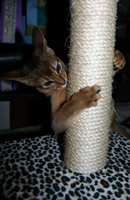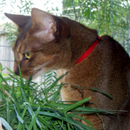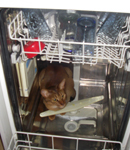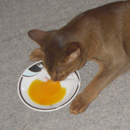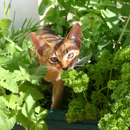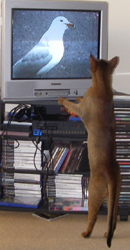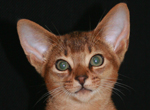

Kitten care
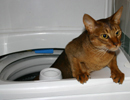
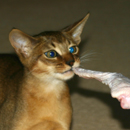
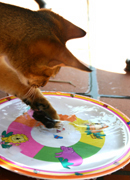

Caring for your kitten
Arrival Environment Dangers Diet Health Toileting Outside
Arrival
Before your kitten is due to arrive home make sure you have provided it with a room or area that it will identify as a safe place. This area should include a clean area for food, water and a bed/box as well as a litter tray that is not too close to the eating area. Show the kitten the litter tray straight away and place it on the litter so that it knows this is its toileting area.
Environment
Abyssinian kittens are active and playful. They need a stimulating and safe environment to grow up in. Providing your kitten with toys, a scratching post and a warm area to sleep are essential to its well-being. Cats naturally want to explore, hunt and scratch things so to prevent any unwanted behaviours you must provide them with opportunities for all of those activities. Unwanted behaviours usually indicate something wrong in the cat’s life, not a cat that is trying its best to annoy you!
Scratching posts found in some pet shops tend to be too short or unstable for a cat to use effectively. A scratching post should be taller than a fully stretched cat and stable enough so the cat cannot pull it over or knock it over with a flying leap.
A pot of cat grass will be a welcome bit of greenery for an inside cat. Other plants such as catnip, cat mint, native violet, dandelion and valerian are cat friendly foliage that your cat may enjoy in their environment.
Dangers
There are many things in the household environment that present possible dangers to your kitten. Open washing machines, dish washers and ovens as well as hot elements. Cords hanging from blinds and open cupboards that become closed cages to an inquisitive kitten may cause problems. Make sure all household chemicals and cleaners are kept out of the way of a curious kitten. Many plants are poisonous to cats and you must be very careful of the lily flower as the pollen is highly toxic and has the capability of killing your cat.
Diet
As a kitten is growing it needs to receive important nutrients from its meals. When your kitten arrives at the age of three months it will require three small meals a day. This can later be reduced to two meals a day. We tend to feed our cats a bowl of cat biscuits in the morning and fresh meat in the evening so that they obtain all the essential minerals and nutrients they require. Make sure you do not over feed your cat as many are driven by their stomachs! Special treats such as cheese and egg yolk may be given in small quantities. Raw chicken wings or necks can be given to cats to chew on to help promote healthy teeth and reduce the risk of gingivitis.
Cow’s milk is not recommended for cats and even pet milk made for cats should be given in moderation to cats. Water is the important liquid in your cat’s diet. Make sure there is a fresh bowl or two of water around the house for your cat to drink from. Many Abyssinian cats find their own favourite drinking hole whether it be from the bath, kitchen sink or your own glass of water!
Health
It is important that you take you cat to the vet for regular checkups and vaccinations. When your kitten leaves us it will have had its first set of vaccinations against feline enteritis and rhinotracheitis calicivirus. Each year a booster shot is required. Your kitten will be wormed and should be free of fleas. There are various products available to control these parasites and a close check should be maintained throughout your animal’s life and treatment should be given as indicated on the product. Make sure the product is specific for cats and kittens.
WC
Cats are very fastidious creatures and this is particularly so when it comes to the toilet. A clean litter tray is an appealing site for a cat. Make sure it is cleaned regularly and is away from their eating area. There are a variety of litter products available including, paper pellets, wood pellets or clay chips. The paper litter is probably the safest option for young kittens. If your cat uses anything except the litter tray as a toilet remain calm and kindly show it where the litter tray is located. A recent theory I have read about is that there should be a litter tray for each cat in the house plus one more.
Going outside
The outside suburban world is full of possible dangers to your cat. If you let your cat roam the streets it is open to dog attacks, being stolen or run over by a car. It also means it has the potential to be involved in cat fights and therefore has the opportunity of acquiring infectious diseases/viruses/parasites. Abyssinians are keen hunters and if let out will not only dessimate the mouse/rat population but will also destroy any native fauna lurking in your backyard.
There are many ways of making outside enclosed areas for your cat whether you do it yourself or select one of the many enclosure companies to design and install something for you.
Many Abyssinian cats take to walking on a lead and this can be useful if you live in an apartment and want to provide your cat with an exercise regime. You will need to get the harness on the kitten as soon as possible so it gets used to the idea of having something around its body. Once it is used to the harness attach a lead and practice walking around the house. Let the cat explore but when it tries to go somewhere that is out of bounds tug lightly on the lead and call the cat. Eventually the cat should understand this gesture and respond to it accordingly. Try not to give in to the cat otherwise you will have no control when out walking.


